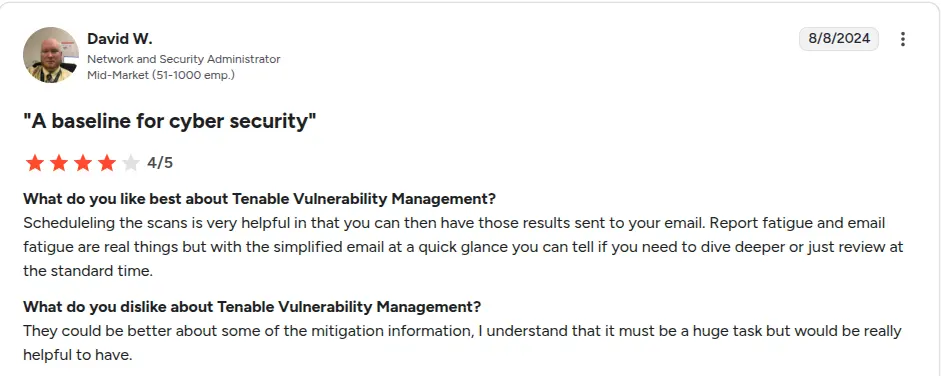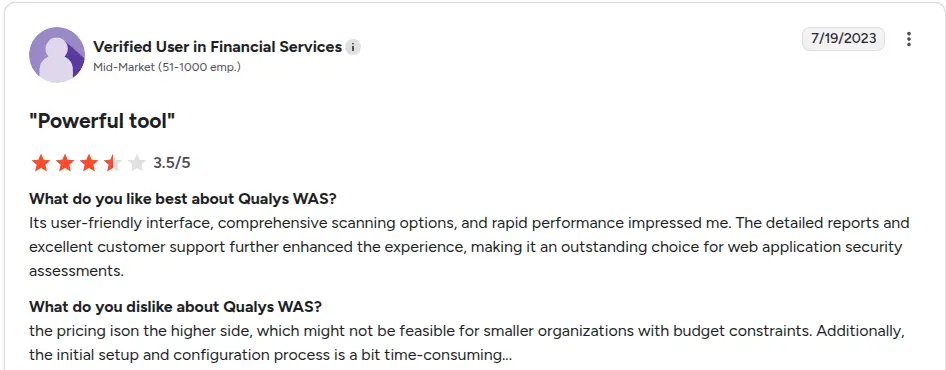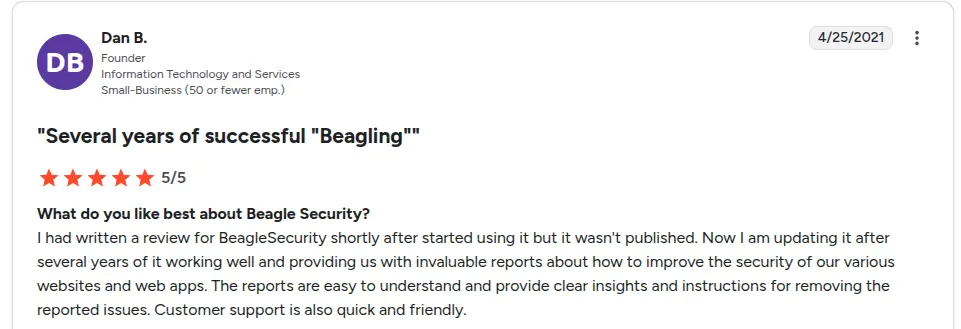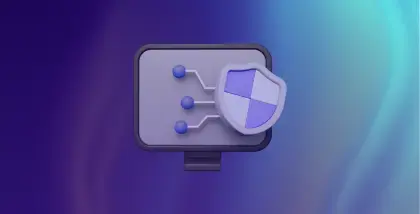![Tenable vs Qualys vs Beagle Security: Which is the best choice for you? [2025] Tenable vs Qualys vs Beagle Security: Which is the best choice for you? [2025]](/blog/images/tenable-vs-qualys-vs-beagle-security.webp)
Choosing the right web application and API security testing platform can feel like navigating a minefield. With legacy giants like Tenable and Qualys dominating the conversation, many enterprises often overlook modern, agile alternatives. Should they?
In this detailed comparison blog, we will break down the core differences between Tenable and Qualys. A third contender worth noting is Beagle Security an AI-native platform purpose-built for web and API penetration testing, offering intelligent test orchestration and compliance-ready insights with minimal setup.
This blog will help you make an informed decision based on real-world needs.
Tenable vs Qualys at a glance
| Features | Tenable | Qualys |
|---|---|---|
| Main features | Dynamic Application Security Testing (DAST) | Dynamic Application Security Testing (DAST) |
| AI features | Not adopted | Not adopted |
| Ease of use | Moderate | Easy to use |
| Free trial | Yes | Yes |
| Pricing range | $3,500/year (100 assets) | Custom quote |
| G2 rating | 4.5 | 4.3 |
| Gartner Peer Insights rating | 4.6 | 4.4 |
An alternative web & API penetration testing platform for comparison: Beagle Security
Beagle Security is a next-generation DAST platform purpose-built to address a challenge many teams face today: achieving deep, meaningful security testing without the complexity, steep learning curves or high costs often associated with enterprise tools.
While Tenable and Qualys have strong roots in traditional vulnerability management, they often reflect a legacy approach that can feel rigid and infrastructure-focused.
Beagle Security stands out with its developer-first mindset, AI-powered automation and seamless support for modern technologies like SPAs and GraphQL making it a natural fit for today’s fast-moving DevSecOps environments.
Why choose Beagle Security over Tenable & Qualys?
- No learning curve
Beagle Security is designed for immediate usability with no complex setup or training required. Security teams can launch tests within minutes, saving their valuable time.
- Contextual reports
Beagle Security provides human-readable, actionable insights tailored for both developers and decision-makers to quickly address issues.
- No target lock-in
Unlike Tenable and Qualys, Beagle Security allows unlimited flexibility. Test any number of web apps or APIs without being restricted to predefined targets.
- AI capabilities built-in
Uses AI to simulate real-world attack logic, handle business logic authentication, select test cases intelligently, and reduce false positives automatically.
- Most affordable pricing
Beagle Security delivers enterprise-grade security testing starting at under $119 per month which is ideal for both in-house security teams and MSSPs looking for cost-effective tools.
Tenable vs Qualys vs Beagle Security: Feature comparison
| Features | Tenable | Qualys | Beagle Security |
|---|---|---|---|
| AI login & session handling | No | No | Yes |
| Real penetration simulation | No | No | Yes |
| Custom API testing | Limited | Moderate | Yes |
| False positive filtering | No | No | Yes |
| Contextual reports | Basic | Technical | Yes |
Tenable web application scanning features
As an integral component of the Tenable.io platform, Tenable WAS provides continuous visibility into the web application attack surface. Its hallmark capabilities include:
Key features:
- Automated Dynamic Application Security Testing (DAST)
- API Scanning
- DevSecOps Integration
- Vulnerability Intelligence
- Advanced Reporting
Tenable Web Application Scanning is part of the broader Tenable One Exposure Management Platform. What makes Tenable stand out is its risk-based approach that prioritizes vulnerabilities based on exploitability, asset criticality and threat intelligence.
The platform is powered by the widely trusted Nessus scanning engine, giving it strong accuracy in vulnerability detection, especially for traditional infrastructure components.It lacks sophisticated web-specific features like dynamic AI-based business logic testing and context-aware reporting, but it does provide some basic scanning capabilities.
For contemporary DevSecOps teams utilizing GraphQL, and CI/CD pipelines, this may be restrictive. Therefore, rather than being a stand-alone, contemporary DAST solution, Tenable WAS is best suited for businesses who have already made investments in the Tenable ecosystem and want basic WAS capabilities integrated into a larger vulnerability management strategy.
For mid-sized enterprises or MSSPs looking for highly customizable, developer-friendly penetration testing, Tenable WAS might fall short in terms of agility and granularity.
On the plus side, Tenable does offer 24/7 access to its training portal and a vibrant user forum.
Qualys web application scanning features
Key features:
TruRisk™ prioritization engine
Integration with CI/CD tools
Web Application Firewall (WAF) virtual patching support
Asset inventory and discovery
Like Tenable, Qualys Web Application Scanning (WAS) is part of a larger platform, Qualys VMDR. It’s designed to help organizations automatically discover their web assets, continuously monitor them for vulnerabilities and generate reports that meet compliance requirements, even in complex digital environments.
Security teams can concentrate on what really matters by using Qualys’ robust TruRisk™ rating engine, which ranks vulnerabilities according to their exploitability and severity.
While the platform scales well across large enterprises and regulatory environments, users often note its steep learning curve, longer scan durations, and higher false positive rates compared to more developer-centric tools.
If you are a team working with modern frontends then a leaner and more intuitive tool like Beagle Security can offer faster onboarding, deeper integration into development pipelines.
Beagle Security features
AI-powered penetration testing engine
Support for private and GraphQL APIs
Contextual, compliance-ready reports
CI/CD integration for shift-left security
Automation with flexibility
Real-world penetration testing simulations
Easy onboarding and intuitive UX
Business logic testing and login flows
While Tenable and Qualys remain dominant names in vulnerability management, they represent a security philosophy rooted in infrastructure-first thinking. Beagle’s AI engine shifts the core testing paradigm. Instead of predefined scanning rules, it analyzes each application’s structure, tech stack and business logic to generate contextual, dynamic test cases tailored to the way your app actually works.
Beagle’s automated penetration testing doesn’t just check for CVEs. It actively simulates how an attacker might exploit your web app or API, making it far more effective at uncovering real-world flaws.
Its API-first security model is another clear differentiator. Beagle treats APIs not as add-ons, but as critical surfaces, with support for GraphQL, REST, and internal APIs. Unlike platforms that retrofit API scanning into broader systems, Beagle’s API discovery and authorization mapping were engineered from the ground up.
In contrast to Tenable and Qualys where workflows can feel isolated, integrations require tuning and reports often cater to compliance more than code, Beagle Security bridges security and development. Its reports are developer-friendly, remediation-ready, and mapped to compliance standards for teams that need both speed and structure.
Tenable vs Qualys vs Beagle Security: Pricing comparison
| Platform | Starting price | Free trial |
|---|---|---|
| Tenable | $7,434/5 FQDNs | 30 day free trial |
| Qualys | Custom quote | 30 day free trial |
| Beagle Security | Self-serve plans start at $1188/year Enterprise plans start at $8500/year for 5 concurrent tests | 14 day free trial |
Tenable pricing
Tenable Web Application Scanning, starting at $7,434 per year for 5 FQDNs, is positioned as a scalable, enterprise-ready solution within the broader Tenable One platform.
Pricing is based on FQDN, offered in fixed bundles, requiring additional contracts if you need to scale beyond standard limits.
While Tenable does provide a free trial, it’s often limited in functionality and gated behind registration, making it less convenient for thorough hands-on evaluation.
Qualys pricing
Pricing is determined on the amount of modules and apps you wish to scan. It uses a per-target cost basis for the majority of use cases, which can quickly increase in dynamic contexts.
Qualys lacks a free trial and frequent bundling with other Qualys products making standalone web scanning less accessible.
Beagle Security pricing
Beagle Security is refreshingly transparent. Pricing is based on features and usage, not arbitrary target limits. It offers annual and monthly plans with MSSP-friendly models. Most importantly, you can try it for free before actually choosing.
Even at lower tiers, you get access to core features including AI automation, business logic testing, and CI/CD integration, making it one of the most cost-effective platforms for proactive security testing.
Tenable vs Qualys vs Beagle Security: Customer reviews comparison
| Criteria | Tenable | Qualys | Beagle Security |
|---|---|---|---|
| Ease of use | 89% | 82% | 95% |
| Ease of setup | 87% | 81% | 96% |
| Ease of admin | 87% | 86% | 93% |
| Quality of support | 84% | 81% | 97% |
| G2 ratings | 4.5/5 | 4.3/5 | 4.7/5 |
As of latest G2 comparison
Tenable reviews
Tenable continues to receive strong reviews on platforms like G2, with users praising its comprehensive vulnerability coverage, intuitive dashboards, and frequent plugin updates.
Many users appreciate the Vulnerability Priority Rating (VPR) system, which helps teams prioritize remediation efforts based on real-world exploitability.

That said, Tenable isn’t without its limitations. Some reviewers point out that initial setup can be complex, particularly in large or hybrid environments.
Others mention that scan times can become lengthy as asset counts scale, and a few cite slow support response times when troubleshooting issues.
Qualys reviews
Qualys earns a solid 4.4/5 rating, with users highlighting its strong asset visibility, integrated vulnerability management, and TruRisk™-based prioritization.
Many security teams appreciate how the platform helps them focus on high-risk vulnerabilities and integrates well with ITSM tools like Jira and ServiceNow to streamline remediation workflows.

However, the platform isn’t without drawbacks. Several users point out the steep learning curve, occasional false positives, especially for teams new to enterprise-grade tooling.
Beagle Security reviews
Beagle Security consistently earns praise for its clean, intuitive UI, developer-friendly reports and realistic attack simulations. Users value how the platform balances depth and usability, with AI-driven testing that feels tailored rather than generic.
Onboarding is seamless, even for teams without deep security expertise and launching a test takes just a few clicks.

Reports are structured to deliver both technical clarity and business relevance, making it easier for engineering teams to act without waiting on security analysts. The responsive support team and transparent pricing only strengthen its appeal to modern, fast-moving product and DevSecOps teams.
Tenable vs Qualys vs Beagle Security: Which is best for you?
Choose Tenable if:
You focus on infrastructure and network security.
You need broad exposure management across assets, cloud, and OT.
You have a dedicated team to manage complex configurations.
Choose Qualys if:
You need an all-in-one, cloud-native security platform.
Your dev team adjusts with outdated, clunky UI and frustrating false positives.
You can manage inconsistent support and difficult third-party integrations.
Choose Beagle Security if:
You value AI-driven testing, actionable remediation, and CI/CD-friendly integration.
You want real-world attack simulations without dealing with complicated setup or tuning.
You’re done with target lock-ins and overpriced FQDN-based plans.
You test modern web apps, APIs, GraphQL, and apps with dynamic login flows.
You need enterprise-grade testing without the complexity or premium pricing.
Try Beagle Security for free to see how it compares to Tenable and Qualys
Tenable vs Qualys can often feel like choosing between two legacy-heavy platforms that are powerful, but complex and built for a different era.
If you’re looking for something faster, smarter, and built for modern web and API security, Beagle Security is the clear choice.
It delivers the capabilities you need like AI-powered testing, developer-friendly reports, and seamless CI/CD integration, without the complexity or enterprise bloat.
See why growing teams and security-forward organizations are making the switch to Beagle Security.
Start your 14-day free trial or schedule a demo to see Beagle Security in action.



![Acunetix vs Nessus: Which is right for you? [2026] Acunetix vs Nessus: Which is right for you? [2026]](/blog/images/acunetix-vs-nessus-which-is-right-for-you-2026-cover.webp)
![OpenVAS vs Nessus: Which is the best choice for you? [2025] OpenVAS vs Nessus: Which is the best choice for you? [2025]](/blog/images/openvas-vs-nessus-which-is-the-best-choice-for-you-2025-cover.webp)


![Top enterprise application security tools [2026] Top enterprise application security tools [2026]](/blog/images/blog-banner-four-cover.webp)
![Top vendor application security testing tools [2026] Top vendor application security testing tools [2026]](/blog/images/blog-banner-six-cover.webp)
![Best API security tool for developers [2026] Best API security tool for developers [2026]](/blog/images/blog-banner-five-cover.webp)

![Top Bright Security alternatives [2026] Top Bright Security alternatives [2026]](/blog/images/blog-banner-one-cover.webp)